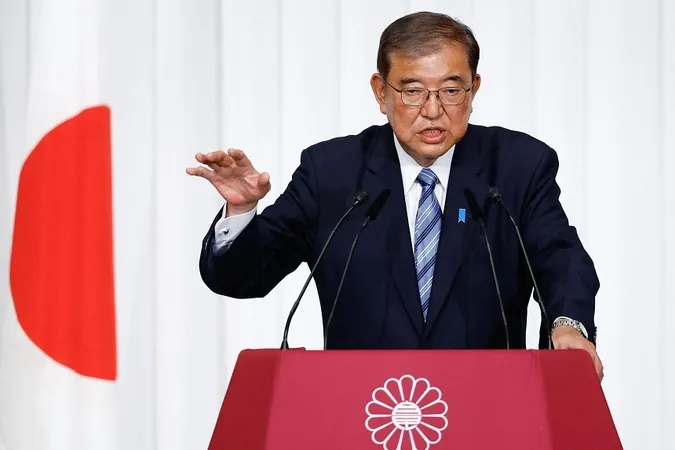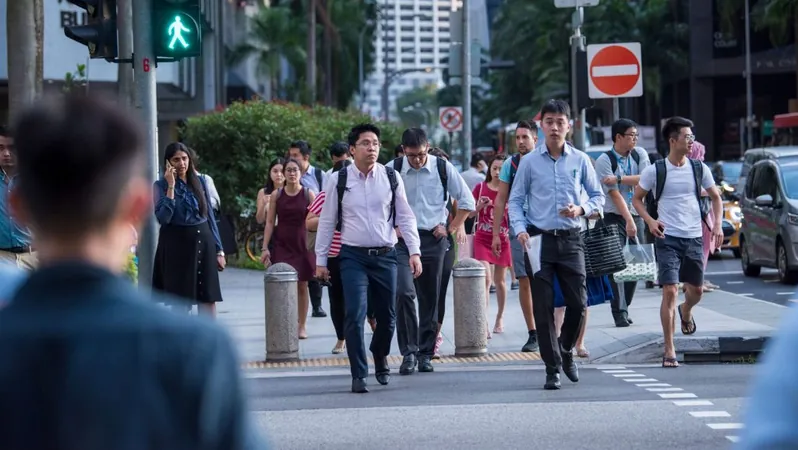
Japan PM Ishiba Vows to Remain in Office Despite Election Setback
2024-10-28
Author: Daniel
Japan PM Ishiba Vows to Remain in Office Despite Election Setback
TOKYO - In a surprising twist for Japan's political landscape, Prime Minister Shigeru Ishiba has pledged to continue in his role following a disastrous snap election held on October 27. The election results, which marked the worst outcome for Ishiba's ruling Liberal Democratic Party (LDP) in 15 years, have left many questioning the future of his leadership.
Ishiba, who took office just weeks earlier on October 1, faced significant backlash from voters disillusioned by a slush fund scandal involving LDP members. This scandal, which prompted significant public outrage, appears to have significantly influenced the election results, contributing to a sharp decline in support for the party that has dominated Japanese politics since 1955.
Despite the projections suggesting that the LDP and its junior coalition partner Komeito would lose their ruling majority, Ishiba expressed his determination to prevent a "political vacuum" in Japan. "I want to fulfill my duty by protecting people's lives and protecting Japan," he told reporters after the election results began to roll in.
The election highlighted a growing sentiment of mistrust among the public, with voters expressing their dissatisfaction primarily driven by suspicions surrounding the handling of political finances. Ishiba emphasized that he would pursue fundamental reforms addressing "money and politics" in response to what he characterized as a “severe judgment” from the electorate.
In addition to the political implications, the economic fallout was immediate. The yen fell to a three-month low, sliding over 1 percent against the dollar, as the election results led investors to reassess their confidence in the ruling coalition.
The LDP secured only 191 seats in the 456-member lower house, a stark decline from the 259 seats it held in the previous 2021 election, while Komeito managed to retain just 24 seats. Early reports forecasted that Ishiba's goal of reclaiming at least 233 seats was far from reached.
Speculation was rife in Japanese media about Ishiba's potential resignation following what many described as a historic defeat, raising fears he could become the nation's shortest-serving prime minister in the modern era. However, on October 28, the head of the LDP's election committee, Shinjiro Koizumi, announced his resignation, signaling tensions within the party.
Looking ahead, analysts predict that Ishiba is likely to attempt to form a minority government, as the fragmented opposition appears unable to coordinate a unified front. Interestingly, while some factions of the LDP may seek to exploit this moment to challenge Ishiba, others might choose to rally behind him to avoid further destabilization at this precarious time.
An unexpected victor in the election was the Constitutional Democratic Party, led by former Prime Minister Yoshihiko Noda, which dramatically increased its seat count to 148 from 96. Noda commented on the election outcome, asserting that voters had decisively backed parties advocating for significant political reforms and suggesting that the current administration could no longer sustain its authority.
Moreover, minor parties also flourished, with the Reiwa Shinsengumi party, founded by a former actor, tripling its representation to nine seats after its platform promised to abolish the sales tax and boost pension contributions. The newly established Conservative Party of Japan, a platform focused on immigration skepticism and traditional values, also made its mark by securing three seats in the legislature.
Notably, the election saw an increase in female representation, with the number of women lawmakers reaching a record high of 73. However, they still only account for less than 16 percent of the total legislature, highlighting the ongoing gender disparity in Japanese politics.
Amidst the rainy streets of Tokyo on October 28, voters expressed their feelings about the election outcome. "As long as our own lives don’t improve, I think everyone has given up on the idea that we can expect anything from politicians," restaurant worker Masakazu Ikeuchi, 44, shared with a sigh. Fellow voter Takako Sasaki echoed this sentiment, suggesting that the results reflect a broader desire for change among the populace.
As Japan braces itself for the challenges ahead, Ishiba's capacity to navigate this turbulent political landscape will be put to the test. The future of his leadership hangs in a delicate balance, dependent on the actions he takes in the wake of this electoral setback. Stay tuned for what might unfold next in Japan’s political saga!


 Brasil (PT)
Brasil (PT)
 Canada (EN)
Canada (EN)
 Chile (ES)
Chile (ES)
 España (ES)
España (ES)
 France (FR)
France (FR)
 Hong Kong (EN)
Hong Kong (EN)
 Italia (IT)
Italia (IT)
 日本 (JA)
日本 (JA)
 Magyarország (HU)
Magyarország (HU)
 Norge (NO)
Norge (NO)
 Polska (PL)
Polska (PL)
 Schweiz (DE)
Schweiz (DE)
 Singapore (EN)
Singapore (EN)
 Sverige (SV)
Sverige (SV)
 Suomi (FI)
Suomi (FI)
 Türkiye (TR)
Türkiye (TR)